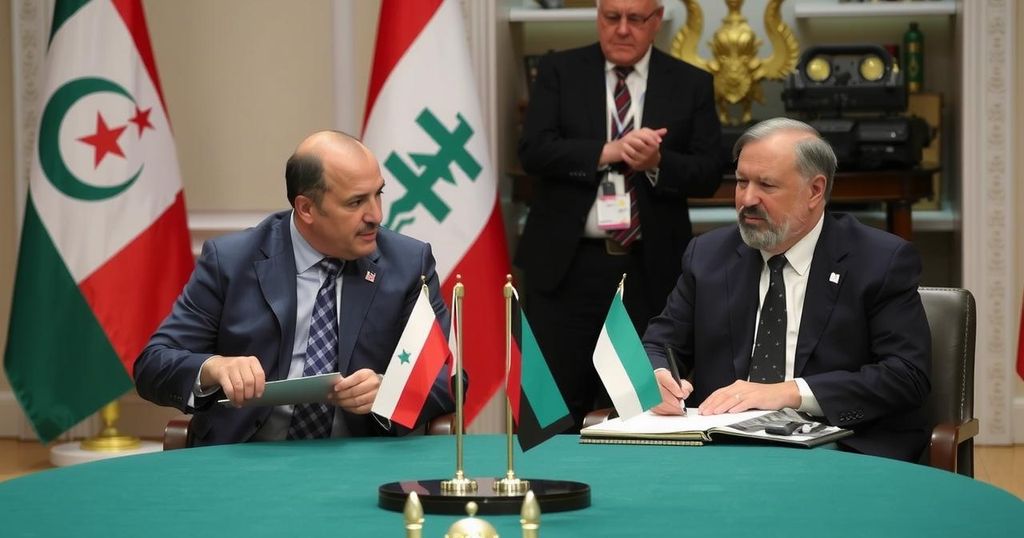Libya and Syria Discuss Energy and Migration Amid Diplomatic Revival

A Libyan official met with Syria’s new leader to discuss diplomatic relations, energy, and migration issues. Emphasizing cooperation on security and military topics, they seek to strengthen ties amidst Libya’s divided power landscape. Diplomatic representation aims for a permanent ambassador, while the meeting parallels Bahrain’s efforts towards regional stability. This indicates a broader Arab engagement with Syria following the recent regime changes.
A senior official from Libya’s UN-recognized government convened with Ahmed al-Sharaa, the newly appointed leader of Syria, in Damascus on Saturday to address a range of issues including diplomatic relations, energy cooperation, and migration challenges. Minister of State for Communication and Political Affairs Walid Ellafi articulated their support for Syria as it transitions, emphasizing the necessity for regional coordination, especially concerning security and military matters. Furthermore, discussions encompassed enhancing diplomatic representation, trade collaborations, and tackling illegal immigration, particularly in the context of Syrian refugees seeking better opportunities in Libya before heading to Europe.
The meeting highlights the dynamics of power in Libya, where authority is currently contested between the Tripoli-based government and a rival administration backed by military leader Khalifa Haftar. Following a prolonged absence of Libyan representation in Damascus since 2012, Ellafi mentioned the presence of the charge d’affaires at the meeting, indicating a move toward reinstating a permanent ambassador. The recent diplomatic engagement aligns with an emerging trend as multiple Arab nations, including Bahrain, seek to interact with Sharaa’s leadership since their recent consolidation of power.
Additionally, images released by Syrian state media depicted Sharaa’s meeting with officials from Bahrain, reiterating the kingdom’s commitment to fostering dialogue for Syria’s stability and supporting a comprehensive transitional process. Following the collapse of Bashar al-Assad’s administration, Bahrain’s King Hamad expressed a willingness for ongoing consultations with the Syrian government, underlining regional efforts aimed at diplomatic restoration and economic recovery across the war-torn nation.
The meeting between Libyan and Syrian officials is significant within the context of shifting diplomatic relations in the Middle East. Syria has faced a prolonged civil war since 2011, leading to widespread displacement and migration. The recent establishment of diplomatic ties between Libya and Syria marks an essential step following years of political isolation since the civil upheaval in Libya against Moamer Kadhafi’s regime. The current geopolitical landscape reflects a gradual reinstatement of diplomatic engagements between the two countries amidst their respective internal challenges. This meeting also underscores a broader Arab reconnection with Syria as various nations reassess their policies following Assad’s regime changes.
In conclusion, the discussions between Libyan officials and Syria’s new leadership signify a pivotal moment in the re-establishment of diplomatic ties. Addressing critical issues such as energy cooperation and migration reflects a collaborative effort toward regional stability and security. The growing engagement among Arab nations with Syria indicates a shift towards a collective approach in supporting the country’s transitional phase and fostering reconciliation. This development may pave the way for further diplomatic advancements in the region.
Original Source: www.hindustantimes.com








